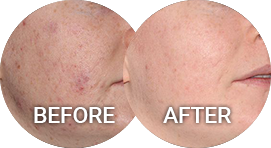Food Allergies
Conveniently located to serve the areas of Phoenix, AZ

A food allergy is a serious health condition that occurs when the body’s immune system mistakenly identifies specific foods as harmful. When someone with a food allergy eats or comes into contact with an allergen, their immune system responds by activating Immunoglobulin E (IgE) antibodies, which can lead to various symptoms ranging from mild digestive issues to severe reactions like anaphylaxis. Understanding food allergies is essential for those who suffer from them, as it empowers individuals to manage their condition and prevent potentially life-threatening situations.
Effective allergy treatment begins with effective and calculated testing. Because allergies can potentially be life-threatening, it is important to take action in managing these issues. Pineapple Health is one of Arizona’s leading providers of allergy care, and we have helped countless patients live safe and healthy lives by helping them identify and monitor their allergens.
If you would like to explore allergy treatment, then schedule a consultation with one of our expert physicians today. If you have any questions about treatment or would prefer to schedule an appointment over the phone, please call our Phoenix office at (480) 961-2366.
Contents
About Food Allergies
Food allergies are a critical concern for millions of people worldwide. The body’s immune response to certain proteins in food triggers symptoms that could range from skin rashes to breathing difficulties.
Common allergens include:
- Peanuts
- Tree nuts
- Shellfish
- Fish
- Eggs
- Milk
- Soy
- Wheat
Education and proper recognition are vital for the safe management of food allergies.
The prevalence of food allergies has been increasing over the past few decades, with research indicating that about 4 to 6 percent of children and up to 4 percent of adults are affected. Food intolerance is different from food allergies, as it typically involves digestive issues rather than the immune system.
Food allergies are categorized into several types, each presenting their own unique challenges:
- IgE-Mediated Food Allergies: These are the most common type. They occur when the body’s immune system produces IgE antibodies against specific food proteins. Symptoms can appear within minutes of exposure and may include hives, swelling, difficulty breathing, and anaphylaxis.
- Non-IgE-Mediated Food Allergies: These allergies typically have delayed reactions that can occur hours or even days after consuming the allergen. Symptoms may involve gastrointestinal distress without immediate adverse reactions.
- Mixed-Type Allergies: Some individuals experience both IgE-mediated and non-IgE-mediated reactions, complicating their diagnoses and management.
- Oral Allergy Syndrome (OAS): This occurs when individuals have allergic reactions to certain fruits and vegetables, usually due to cross-reactivity between pollen proteins and certain food proteins. Symptoms typically present as itching or swelling of the mouth and throat.
- Food Intolerance: While not classified as a true allergy, food intolerance can cause discomfort after eating foods like dairy or gluten but does not involve the immune system’s response.
Benefits
Managing food allergies offers patients a sense of security and a nuanced understanding of their unique bodies. At Pineapple Health, we help our patients achieve:
- Improved Quality of Life: Understanding food allergies enables individuals to enjoy meals without fear.
- Increased Safety: Recognizing and avoiding allergens can prevent severe reactions, including anaphylaxis.
- Better Nutrition: Knowledge of substitutes for allergens helps maintain nutritional health while avoiding unsafe foods.
- Enhanced Awareness: Being informed about cross-reactivity prepares patients to make safer dining choices.
- Access to Support: Identification leads to connections with support groups and communities.
- Preventative Action: Understanding personal allergies encourages proactive measures to avoid triggers.
- Personalized Management Plans: Individuals can work with specialists to develop plans that fit their lifestyle and dietary needs.
- Empowerment: Feeling knowledgeable about one’s condition fosters confidence in managing food-related situations.
- Emergency Preparedness: By understanding your allergies and your body’s reactions, you will be able to manage your symptoms or instruct others on how to help you should you need immediate aid.
Candidates
Candidates for allergy testing and treatment are patients who have experienced symptoms associated with allergic reactions to food. This can include:
- Hives
- Swelling
- Redness
- Rashes
- Runny or stuffy nose
- Watery or itchy eyes
- Coughing
- Wheezing
- Shortness of breath
- Trouble swallowing
- Nausea
- Vomiting
- Diarrhea
- Abdominal pain or cramping
- Dizziness
- Headaches
- Light-headedness
- Anaphylaxis
Certain symptoms may require immediate medical attention. If patients have a family history of allergies, they may benefit from receiving an allergy test as well.
Personal Consultation
Scheduling a personal consultation at Pineapple Health is the first crucial step for individuals suspecting food allergies. Your professional will conduct a thorough assessment of your medical history and symptoms. They may also inquire about your normal diet and ask you to explain how and what symptoms you experience. An examination may include:
- Skin tests
- Blood tests for IgE antibodies
- Allergen identification
- An elimination diet to determine food sensitivities accurately.
Each patient receives tailored recommendations based on their individual needs and will leave the consultation with a clear understanding of the next steps in diagnosis or treatment.
Food Allergy Testing
The most common food allergy test used in the diagnosis process is the oral food challenge, also known as OFC. In these trials, patients will be presented with small bites of foods containing common allergens, such as peanuts, shrimp and shellfish, soybeans, milk, wheat, corn, and eggs. (1) This is a controlled environment where only small bites of each potential allergen are consumed and medical providers with epinephrine are on standby in the event of anaphylactic shock. These tests lead to diagnoses by monitoring the symptomatic responses to certain allergens.
Oral food challenges are the most reliable form of allergy testing because they allow doctors to see the effects directly. Aside from the food itself, extracts of allergens can be used to test for Immunoglobulin E activation. Using extracts in IgE testing typically yields a much more specific diagnosis, but oftentimes this is unnecessary as long as the foods that cause an allergic reaction are identified. (1)
Food Allergy Treatment
Some allergies can be diminished or overcome with regular exposure to the allergen. This treatment is especially effective if it starts during infancy or toddlerhood. (2) The primary objective of exposure therapies is to investigate the impact of early introductions to small amounts of allergens. By allowing the body to experience the allergic reaction symptoms, it can more effectively tolerate future exposures. Food allergy treatment through continuous exposure is not medically necessary. (2) Thousands, if not millions of people live happy lives with allergies by simply avoiding the allergens that could cause health complications.
If you would like to learn more about treating allergies, then please discuss your potential options with your Pineapple Health provider after your consultation and allergy tests.
Recovering From Allergy Testing
Recovery from food allergy testing often does not require downtime. Observations may be conducted following certain tests, such as oral food challenges, to ensure no immediate reactions arise. Patients typically receive instructions on identifying symptoms and when to seek emergency assistance. Proper monitoring of potential food reactions will help patients manage their dietary restrictions confidently in everyday life.
Results of Allergy Testing and Treatment

Living in fear of unknown allergens is not a fulfilling way to live life. Constant uncertainty at each meal creates unnecessary stress. By undergoing an allergy test, patients receive peace of mind. Knowing what your allergens are is the first step to maintaining a healthy life and mitigating risks. Successful identification frequently results in improved symptom management and subsequent relief from fearful scenarios surrounding food consumption. Accurately pinpointed allergens allow for education and preventive strategies, offering patients richer and safer culinary experiences.
Cost of Food Allergy Treatment in Phoenix
The cost of your food allergy treatment will depend on how many tests are required to diagnose the allergy and what treatments are received to either build up a tolerance or rid yourself of the allergy. The cost of Epipens (epinephrine injectors) may also be included in this price. Insurance plans may cover part of the expenditure, especially for medically necessary tests. During your initial consultation, our team will provide precise estimates to ensure financial preparedness. With all of this said, investing in allergy treatments is an easy way to secure peace of mind and improve your health.
We are happy to speak with all prospective patients, so if you have any questions, please call our Phoenix office at (480) 961-2366.
FAQ
What are food allergies?
Food allergies occur when the immune system reacts abnormally to specific food proteins.
What are common food allergens?
Common allergens include peanuts, shellfish, milk, eggs, wheat, soy, and tree nuts.
Can food allergies cause anaphylaxis?
Yes, food allergies can trigger severe allergic reactions, including anaphylaxis, which is life-threatening.
How can I manage my food allergies?
Management includes eliminating allergens, reading labels carefully, and always carrying an epinephrine auto-injector if prescribed.
Are there treatments for food allergies?
Allergy management may include avoidance of allergens, medication for symptoms, or desensitization therapy under professional guidance.
How do I know if I have a food allergy?
Symptoms after eating certain foods or reactions indicate the need for professional evaluation and possibly testing.
References
- Ito K. Diagnosis of food allergies: the impact of oral food challenge testing. Asia Pacific Allergy. 2013;3(1):59. doi:https://doi.org/10.5415/apallergy.2013.3.1.59
- Kalb B, Meixner L, Heller S, et al. Tolerance induction through early feeding to prevent food allergy in infants and children with sensitization against food allergens (TIFFANI): rationale, study design, and methods of a randomized controlled trial. Trials. 2024;25(1). doi:https://doi.org/10.1186/s13063-024-08114-9



